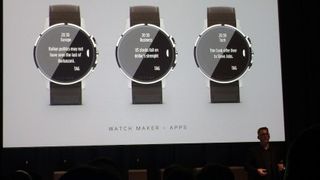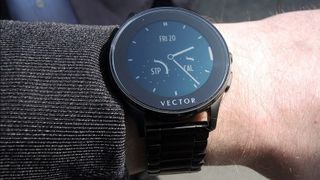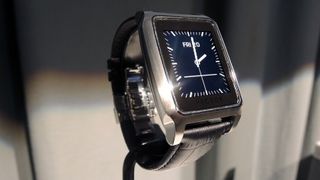What we learned about the future of smartwatches at the world's biggest watch show
When Silicon Valley meets Switzerland… The world will quake! (Or not)
4. Battery life is still seen as a key battleground, and Vector wants to win there

Vector gave a pretty hilarious press conference in what appeared to be either a church hall or a very rich goth's bedroom. As you can see from the above, spelling ain't their strong suit. They're also a pretty funny group, led by the faintly vampiric figure of CEO Joe Santana, formerly of Timex, stoic and bulldog-like CTO Andrei Pitis who does the coding and Nike Fuelband design guy Steve Jarvis.
However, Vector's line of products is potentially really strong. They're keenly priced ($200-$350), and don't try to do too much, yet have the potential scope to do a lot. Mainly, Vector's watches are about basic fitness tracking, notifications and basic calendar functions, and telling the time, for a long time: the potentially killer feature here is 30-day battery life.
To this end, Vector's watches are basically three buttons, a battery-sparing Memory LCD screen (not a touchscreen), an accelerometer and low-energy Bluetooth. They connect to an app, so you can push new faces to them, and notifications arrive with a small vibrating pulse. These can be viewed by turning your wrist to view the screen. Turn your wrist back and the notification is gone, and the watch face is back.
Visibility in high and low light seems good, and all the basics are sound. What Vector is doing is pitching tech to a fashionable crowd, rather than trying to get techies to wear a watch, and the feature set is deliberately kept simple.
There are also a lot of options for potential customers here. Where much smartwatch debate so far has raged around whether a round or square face is better, Vector very cleverly side-steps this by, er, making both.
This is part of Vector's Luna line.

And this is part of its Meridian line.
Get daily insight, inspiration and deals in your inbox
Get the hottest deals available in your inbox plus news, reviews, opinion, analysis and more from the TechRadar team.

I could probably quibble about some of the aesthetic choice here, and some of Vector's marketing claims about "contextual learning" seem a little, er, ambitious, but overall it's a pretty cool product. And who knows? There's an open API, so developers may help take it from "pretty cool" to "very cool" in short order.
Some possible scenarios: there's support for IFTTT and Nest, so you could have scenarios like your heating coming on because the Vector's sleep tracking tells it you've awoken. When you leave the house, your security system knows because of your phone's GPS, and alerts you via the Vector that your alarm's now armed.
That's all for the future, though. For now, Vector is a decent smartwatch that's discreet and has some low-key but clever features, such as showing appointments around the outer edge of the watch face. One to watch.
Current page: Battery life matters and Vector
Prev Page Does Kairos have the answer Next Page Mondaine and Tissot